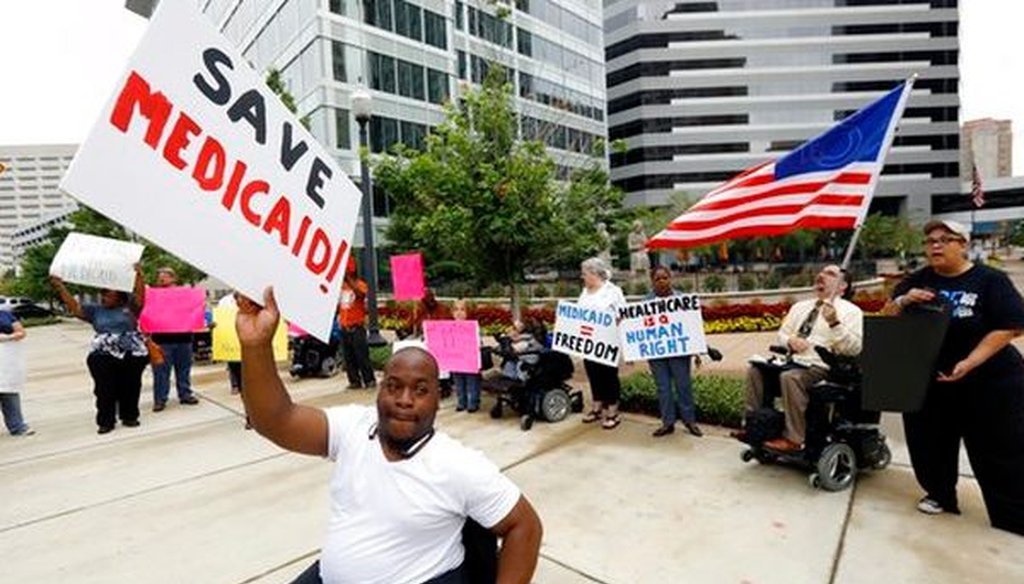Stand up for the facts!
Our only agenda is to publish the truth so you can be an informed participant in democracy.
We need your help.
I would like to contribute
White House still wants Medicaid overhaul that would likely produce cuts

Mario Henderson leads chants of "save Medicaid" outside a Jackson, Miss., building that houses offices of Sen. Thad Cochran, R-Miss., on June 29, 2017.l (AP/Rogelio V. Solis)
In the proposed federal budget he released in February 2018, President Donald Trump reinforced his desire to fundamentally overhaul Medicaid, the joint federal-state health care program for the poor. While that vision has not been enacted into law yet, it appears to take a significant step away from one of his campaign promises -- a pledge not to cut Medicaid.
For starters, the budget reiterates the administration's desire to repeal the Medicaid expansion enacted in some states under the Affordable Care Act, sometimes called Obamacare.
Beyond that, the budget proposes converting Medicaid to a block grant approach, along the lines of a bill submitted by Republican Sens. Lindsey Graham of South Carolina, Bill Cassidy of Louisiana, Dean Heller of Nevada, and Ron Johnson of Wisconsin.
"This would be major change to the program and would reduce federal spending on Medicaid over time," said Christine Eibner, senior economist specializing in health care policy at the RAND Corp.
Currently, the federal government pays a share of Medicaid costs. As costs rise due to inflation, new technologies, and other factors, federal spending increases proportionately.
By contrast, under a block grant approach, the federal government would pay fixed amount that would increase over time with the general inflation rate, but would not necessarily keep up with the cost of health care, which usually rises faster than other types of prices.
The administration's budget document portrays this "Medicaid financing reform" as something that "would empower states to design individual, state-based solutions that prioritize Medicaid dollars for the most vulnerable and support innovations such as community engagement initiatives for able-bodied adults."
Experts aren't so optimistic.
The changes envisioned by the administration "would lead to savings for the federal government but would leave states holding the bag in terms of how to deal with cost growth," Eibner said. "It is likely that states would need to reduce eligibility or make other changes, such as imposing cost-sharing requirements, to make ends meet." In addition, she said, this approach would preclude states from expanding Medicaid in future years.
On balance, fewer people might get coverage, according to Congressional Budget Office projections based on the original Graham-Cassidy legislation.
In the meantime, a separate administration guidance -- to allow states to impose work requirements for potential Medicaid beneficiaries -- could also pose problems for the promise not to cut Medicaid.
The new policy, released in January 2018, "will have the effect of cutting federal Medicaid spending in those states, because fewer people will qualify if work requirements are imposed," Eibner said. She added that it's too early to say how many -- or if any -- cuts will result, since it's up to states to determine whether to adopt work requirements, which are optional.
The bottom line is that Trump's pledge to keep Medicaid protected from cuts appears unlikely to be carried out. But since the budget proposal is non-binding, and since the work-requirement policy is too new to gauge its impact, we'll keep the rating for this promise at Stalled.
Our Sources
President's Fiscal Year 2019 budget proposal
Congressional Budget Office, "Preliminary Analysis of Legislation That Would Replace Subsidies for Health Care With Block Grants," Sept. 25, 2017
Kaiser Family Foundation, "Medicaid and Work Requirements: New Guidance, State Waiver Details and Key Issues," Jan. 16, 2018
Email interview with John Holahan, fellow in the Health Policy Center at the Urban Institute, Feb. 14, 2018
Email interview with Christine Eibner, senior economist specializing in health care policy at the RAND Corp., Feb. 14, 2018
